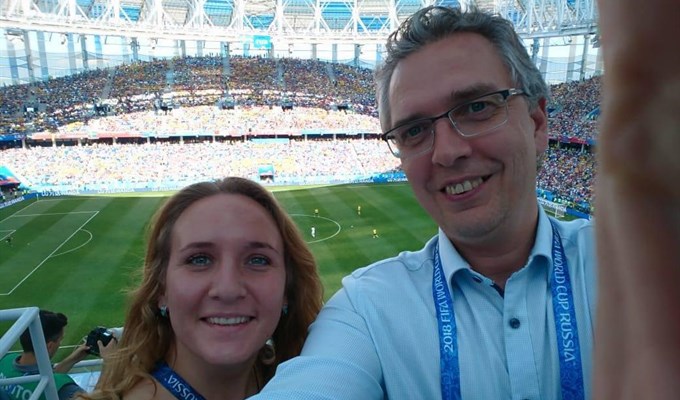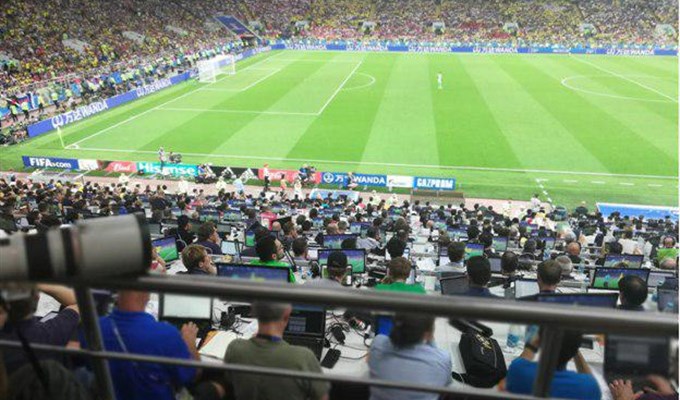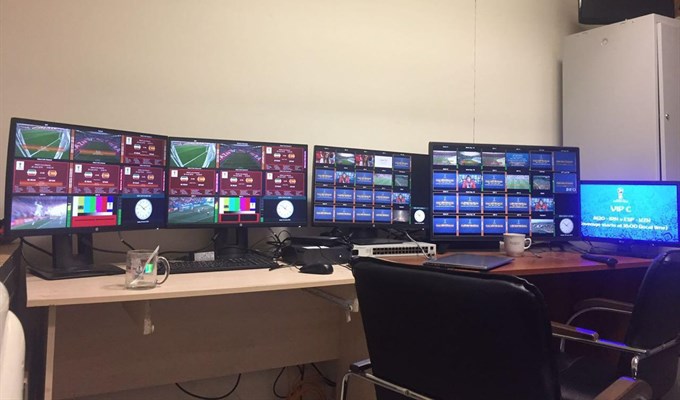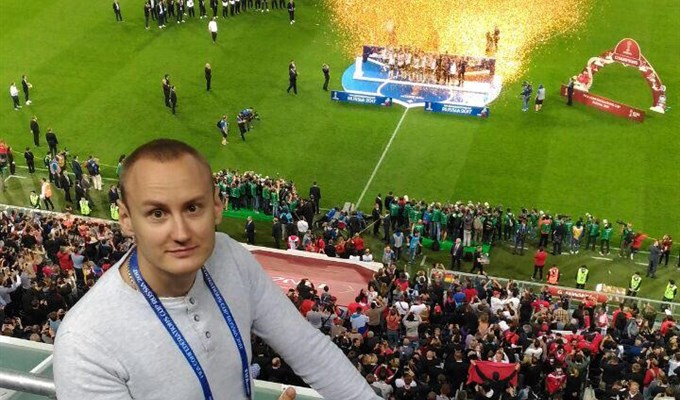TOMSK, Jul 18 –
RIA Tomsk. Elecard Company provided broadcast of the FIFA
World Cup – 2018, its equipment allowed to transfer image from stadiums to
representatives of the press with the minimum delay in 0,3 seconds. What showed
in locker rooms of football players, how to save the ether with one switch and
why Japanese watched best in the world "picture" – in material of RIA
Tomsk.
Earlier it was reported that
the FIFA World Cup took place from June 14 to July 15, 2018 at stadiums in 11
cities of Russia. The Tomsk Company "Elecard" signed the contract for
ensuring broadcast of matches at stadiums. Its experts proposed such solutions
on transfer of video which had to simplify work of commentators and allow the
audience to see better broadcasting.
High-quality reportage
Sixteen specialists of Elecard
arrived to the cities of holding the World Cup in two weeks prior to start of
the competitions. "We were chief engineers on cable television at five
stadiums of 12, and ensured functioning of the equipment at the others", –
the director of the company Nikolay Milovanov told RIA Tomsk. He worked in
Nizhny Novgorod.
© предоставлено Николаем Миловановым
Nikolay Milovanov at the stadium in Nizhny Novgorod
According to him, the main
task which the FIFA sets for speakers at stadium, – to provide the press with
"picture" in real time (that those in turn could do qualitative
reports for the whole world).
Jobs of commentators on a
media tribune are located so that the football field is perfectly visible from
there, and still everyone has one and even two monitors – to watch repetitions,
statistics, close ups and broadcastings from other stadiums and press conferences.
© предоставлено Николаем Миловановым
Media tribune at the stadium
But transfer of a SDI signal
(that is not compressed format of high definition) from the telespeaker on
screens of commentators always went with an essential delay – 2-3 seconds. And
here, for example, situation: operator of broadcasting, using a pause in a game
(let's say there is a preparation for a penalty), gives repetition of a moment.
But instantly switches to a game as soon as the pause in it comes to an end.
In the same second a football
player scores a goal, and the commentator still parses the replay on the screen
because sees it with a three-second delay … As the staff of Elecard working at
stadiums remember, many commentators just stacked monitors on a table not to
distract at the beginning of the championship. To the second game news that
monitors work synchronously with a match has promptly expatiated on the shop,
and already nobody overturned them.
© предоставлено Николаем Миловановым
Besides commentator positions, the picture in stadiums was transferred to screens to VIP-boxes, mix-zones, locker rooms of football players round the clock. In each case there was content. For example, only the current game could be shown not to distract players in locker rooms.
Inexpensive solution
"We were engaged in
broadcasting exactly in stadiums. Roughly speaking, we were given eight TV
channels, we had to remove a signal, code (to compress) it and to transfer
further to consumers at stadium", – Milovanov tells.
Theoretically the cables could
be held on to each commentator, it was made earlier (for example, at the
Olympic Games in Sochi). But the SDI monitor is expensive in comparison with
the ordinary TV, considering that there were many times more of
commentators in the World Cup, than at the same Olympic Games (500
worked at the WC final in Luzhniki, for example). Expenses would go beyond the
budget of broadcasting.
"Therefore organizers
have chosen the decision based on transfer through cable digital television,
but with the minimum delay. All process of delivery occupies about 300
milliseconds (0,3 seconds). Use of our decision allowed to reduce much costs of
broadcasting", – Milovanov says.
Also he emphasizes: "For
the first time in the world telecommunication Russian technologies were applied
in such quality and scale. Thanks to federal support at various levels (it is a
work in a technology development zone, and support of administration of the
Tomsk region, and grants of the Bortnik's Foundation), we could make new codecs
and develop competitive technology".
© РИА Томск. Таисия Воронцова
All TV channels of the world received the picture in Full HD resolution. And only Japan watched the championship in 4K-resolution at which the accuracy of transfer of points is four times more. Japanese came to each match by the team with own equipment in two days and prepared special air for Japan.
"Come to Qatar!"
"Everything already
worked ideally to the championship quarterfinal, but it was necessary to run in
two weeks prior to the competitions and the first one and a half weeks of
matches. It is just built networks, the equipment behaves differently at each
stadium. There are five minutes for correction of any situation, otherwise –
penalties and trial with FIFA", – Milovanov tells.
There were, for example,
situations when someone has accidentally switched off power on a media tribune.
Or – an engineer comes to the post before matches, and none of TVs work …
"You begin to check –
there is no signal. Thanks to the system of monitoring you find that the
problem in network can be in such room where, perhaps, electricians have
unintentionally turned off the switch. The next challenge is to find
the keys. Sometime we just tried a key … I wrote then in the report: I won't
tell how I have opened this door, but power supply of amplifiers of network at
the stadium was restored", – the director of Elecard smiles.
In general, he considers, from
the technical point of view the team of organizers worked excellently:
"Yes, there were disagreements against which all of us together fought,
but the main thing is that people worked for their names, and the name of the
countries. And at the end they were highly appreciated by one of heads of
technical broadcasting of FIFA: "Delivery and service were outstanding
from the beginning to the end. Pack things and come to Qatar (the country of
holding of the FIFA World Cup – 2022 – Ed.)!"
© предоставлено Виктором Ширшиным
Also Elecard provided broadcast of the Confederations Cup in Moscow, Kazan, Sochi, St. Petersburg in 2017. The quality of the picture then was worse, but residents of Tomsk together with partner suppliers of the equipment improved the program complex in a year, and the picture became ideal.